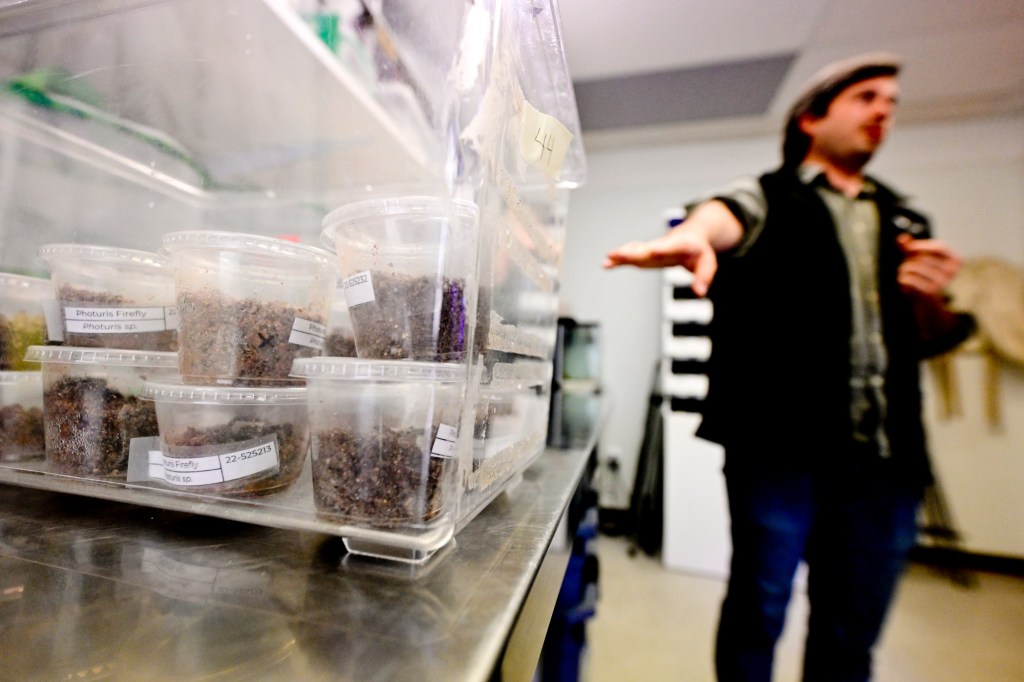After two years of research and careful studying, scientists at the Butterfly Pavilion in Broomfield have become the first to ever raise Colorado fireflies in captivity.
The scientists at Butterfly Pavilion, understandably, are always excited about bugs. But one day in June marked a particularly exciting milestone for their ongoing research into Coloradan fireflies.
“People look and see this tiny beetle and don’t think it’s anything special, but we were all so excited,” said Francisco Garcia, entomology manager at Butterfly Pavilion. “We were all screaming and excited and celebrating two years of hard work.”
Garcia is one of the many researchers who worked to collect and raise the fireflies, which emerged in late June. The beetles were collected in Fort Collins in 2021, and Garcia and his coworkers have spent the last two years learning about their life cycle.
“Raising these beetles takes a lot of time and effort,” Garcia said. “It took two years of finding the right substrate, keeping them moist and feeding them twice a week. It’s a lot of time and effort invested by all of us.”
Garcia explained that many Coloradans don’t know that we have species of fireflies, as their populations are small and isolated. In addition, the adult fireflies only live for two weeks, making it more difficult to see and study them.
“In tropical species of fireflies, they can develop within a few months. But these species take years to develop from eggs into adults, and then you only have two weeks with them,” Garcia said.
Beyond fireflies, Butterfly Pavilion studies and displays all manner of invertebrates, from the beloved Rosie the Chilean rose hair tarantula to a variety of underwater invertebrates, like corals and urchins.
Despite invertebrates making up 97% of the animal species on Earth, they remain understudied.
“I do consider invertebrate science to be one of the last frontiers in science because we have researched so much about so much of the world around us but with invertebrates we know so little,” said Shiran Hershcovich, lepidopterist manager at Butterfly Pavilion. “When you look at the breakdown of the research that has been done versus the amount of life that invertebrates encompass, it just doesn’t match up because they’ve been ignored.”
Hershcovich explained that part of the reason invertebrates are understudied is because they’re small and difficult to identify, and many people don’t consider them as charismatic as other animals.
“When people go into animal science often they go into it because they want to study tigers or dolphins or charismatic megafauna where a lot of the attention has gone,” she said. “But we really should be caring about them more, not just because they’re cool, but for selfish reasons as well.”
Invertebrates, including fireflies, are vital parts of the ecosystem. From cycling nutrients in the soil, controlling pests or pollinating plants, life as we know it could not exist without them.
“We rely on them for survival, from food to the air that we breathe,” Hershcovich said. “Not only do they provide us with food, but it’s the best of the food — from our morning coffee to bars of chocolate.”
Butterfly Pavilion is the first Association of Zoos and Aquariums-accredited, stand-alone, nonprofit invertebrate zoo in the world, and it works on projects like studying firefly life cycles and developing pollinator habitats around the world to encourage education and help foster a new appreciation for invertebrates and the work that is required to protect them.
One way people can help contribute to Butterfly Pavilion’s mission is to engage in community science through projects like Colorado Firefly Watch, where residents can help gather data about firefly sightings in Colorado.
“When we think of a scientist, we think of somebody wearing a lab coat and goggles in this academic setting that has a bunch of test tubes around,” Hershcovich said. “But that’s not what science or a scientist is at all, science is everyone at any time.”
Garcia and Hershcovich along with their colleagues are continuing to study Colorado fireflies and their life cycle, and hope to continue raising the beetles into adulthood and eventually create a sustainable population of lab-reared fireflies, sharing what they learn with facilities across the country to further the study and conservation of these unique beetles.
Get more Colorado news by signing up for our daily Your Morning Dozen email newsletter.
Source: Read Full Article






